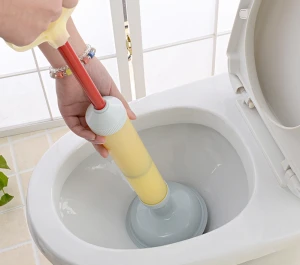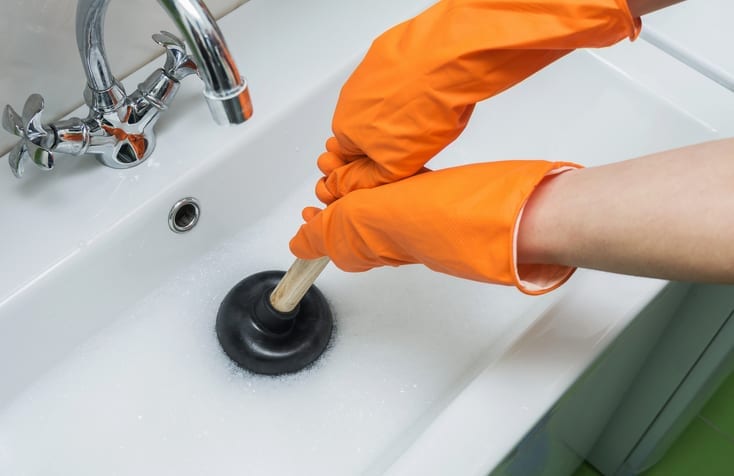How to Effectively Apply Plungers and Drain Cleaners: Expert Guide
How to Effectively Apply Plungers and Drain Cleaners: Expert Guide
Blog Article
The content underneath in relation to How to Use a Plunger to Unclog a Toilet or Drain is especially insightful. Give it a try and draw your own personal final thoughts.

Introduction
Appropriate upkeep of home drains pipes is important for protecting against obstructions and making sure smooth water flow. Among the key devices in every homeowner's toolkit is the bettor, alongside different drainpipe cleaners made to tackle persistent obstructions efficiently. This post checks out just how to utilize bettors and drain cleansers successfully to keep your drains moving freely.
Area 1: Comprehending Bettors
Types of Plungers
There are numerous types of plungers available, each created for different kinds of drains pipes and obstructs. The most usual types include cup plungers, flange plungers, and accordion plungers.
Exactly How Plungers Work
Bettors service the principle of creating stress and suction to dislodge clogs. When effectively used over a drainpipe, they develop a vacuum cleaner that can pull out particles or break up blockages.
Choosing the Right Plunger
Selecting the right plunger depends on the type of drainpipe and the nature of the obstruction. Mug bettors are suitable for sinks and bathtubs, while flange plungers are better fit for bathrooms due to their design.
Usual Errors with Plungers
Staying clear of these blunders makes sure effective plunging: improper seal around the drainpipe, insufficient pressure, and not clearing bordering debris.
Section 2: Utilizing Plungers Efficiently
Prep work
Before diving, guarantee the bettor covers the drain totally and develops a limited seal. Clear any type of noticeable particles around the drainpipe opening.
Method
Start with gentle plunging motions to build suction. Boost stress slowly, using a constant rhythm. Repeat as necessary up until the drain removes.
Troubleshooting Tips
If plunging does not work, attempt changing the seal, using petroleum jelly for a far better seal, or making use of a various sort of plunger.
Area 3: Understanding Drainpipe Cleaning Company
Kinds Of Drainpipe Cleaners
Drain cleansers can be chemical or chemical. Chemical cleaners utilize solid chemicals to liquify clogs, while enzymatic cleaners utilize all-natural enzymes to break down raw material.
How Drain Cleansers Job
Chemical cleansers respond with obstructions to liquify them, while chemical cleansers break down natural products like hair and oil without hurting pipelines.
Security Factors to consider
Always use gloves and eye protection when using chemical drainpipe cleansers. Make sure ample ventilation and follow maker instructions very carefully.
Eco-Friendly Alternatives
Think about making use of vinegar and cooking soft drink or enzyme-based cleansers for environment-friendly choices that are safer for pipelines and the atmosphere.
Section 4: Making Use Of Drainpipe Cleaners Properly
Application Techniques
Put chemical cleaners directly into the drain opening. Allow them to benefit the advised time prior to purging with hot water. Chemical cleaners must rest over night.
Safety measures
Prevent mixing various sorts of cleaners, as this can generate poisonous fumes. Never utilize chemical cleaners combined with a plunger, as splashing can happen.
Dealing With Persistent Blockages
For persistent blockages, consider utilizing a pipes snake or calling a specialist plumbing to stop damage to pipes.
Final thought
Finally, understanding exactly how to make use of plungers and drain cleaners properly is necessary for maintaining healthy plumbing systems. By selecting the right tools and techniques, house owners can take on small obstructions and prevent major plumbing concerns down the line.
How To Properly Use A Plumbing Snake To Clear Drains
When any drain clogs in our home arise, we tend to gravitate toward the plunger and little else. In cases where the plunger and its vacuum-created pressure are not able to clear clogs, many immediately move to harmful chemicals or simply call their plumber to fix the issue.
we’re happy to help with all drain cleaning needs and concerns. This includes informing you on a few other home remedies you may have at your disposal for minor to moderate clogs, one of which is the use of a plumbing snake. Many people have never used one of these before – let’s go over the steps to take when your drain clogs and you have a plumbing snake available.
Attempt Plunger Use
The first step here, as we noted above, should indeed be to grab your plunger when you notice a drain clog and attempt to resolve it this way. If you’re unsure how to use a particular type of plunger, our plumbers can answer any questions you have. If this doesn’t do the trick, however, you move on to the snake.
Locate And Prepare Snake
A plumbing snake is a metal or plastic device that’s generally about a quarter of an inch thick. It’s design with significant extensions, meant to reach down into your clogged drain and push the clog out. Snakes also contain drain augers that will latch onto and push stubborn blockages.
If your plunger doesn’t clear a clog, locate your snake and bring it to the drain in question. We also recommend keeping a bucket nearby to collect the clog once you pull it out, plus we’d advise wearing goggles and possibly protective gloves.
Feed Snake
Once you’re ready to go, feed the snake slowly down the drain, using the crank device it comes with to keep it moving until it finds the clog. Once this happens, much of the clog will be latched onto the coil so you can pull it out, while the rest will simply break up and flow downward.
Detach Debris
Remove the snake slowly from the drain, and once you’ve done so, pick off any debris that’s stuck to the coil. This is another area where wearing gloves is a must.
Flush Drain
Finally, take a few minutes to ensure the snake has done its job correctly. If you’ve been using it on a toilet, flush the toilet a couple times and make sure everything flows well. If you’ve used it on a different drain, flush it with some room temperature water.
https://www.mybuddytheplumber.com/blog/how-to-properly-use-a-plumbing-snake-to-clear-drains/

Application Techniques
Put chemical cleaners directly into the drain opening. Allow them to benefit the advised time prior to purging with hot water. Chemical cleaners must rest over night.
Safety measures
Prevent mixing various sorts of cleaners, as this can generate poisonous fumes. Never utilize chemical cleaners combined with a plunger, as splashing can happen.
Dealing With Persistent Blockages
For persistent blockages, consider utilizing a pipes snake or calling a specialist plumbing to stop damage to pipes.
Final thought
Finally, understanding exactly how to make use of plungers and drain cleaners properly is necessary for maintaining healthy plumbing systems. By selecting the right tools and techniques, house owners can take on small obstructions and prevent major plumbing concerns down the line.
How To Properly Use A Plumbing Snake To Clear Drains
When any drain clogs in our home arise, we tend to gravitate toward the plunger and little else. In cases where the plunger and its vacuum-created pressure are not able to clear clogs, many immediately move to harmful chemicals or simply call their plumber to fix the issue.
we’re happy to help with all drain cleaning needs and concerns. This includes informing you on a few other home remedies you may have at your disposal for minor to moderate clogs, one of which is the use of a plumbing snake. Many people have never used one of these before – let’s go over the steps to take when your drain clogs and you have a plumbing snake available.
Attempt Plunger Use
The first step here, as we noted above, should indeed be to grab your plunger when you notice a drain clog and attempt to resolve it this way. If you’re unsure how to use a particular type of plunger, our plumbers can answer any questions you have. If this doesn’t do the trick, however, you move on to the snake.
Locate And Prepare Snake
A plumbing snake is a metal or plastic device that’s generally about a quarter of an inch thick. It’s design with significant extensions, meant to reach down into your clogged drain and push the clog out. Snakes also contain drain augers that will latch onto and push stubborn blockages.
If your plunger doesn’t clear a clog, locate your snake and bring it to the drain in question. We also recommend keeping a bucket nearby to collect the clog once you pull it out, plus we’d advise wearing goggles and possibly protective gloves.
Feed Snake
Once you’re ready to go, feed the snake slowly down the drain, using the crank device it comes with to keep it moving until it finds the clog. Once this happens, much of the clog will be latched onto the coil so you can pull it out, while the rest will simply break up and flow downward.
Detach Debris
Remove the snake slowly from the drain, and once you’ve done so, pick off any debris that’s stuck to the coil. This is another area where wearing gloves is a must.
Flush Drain
Finally, take a few minutes to ensure the snake has done its job correctly. If you’ve been using it on a toilet, flush the toilet a couple times and make sure everything flows well. If you’ve used it on a different drain, flush it with some room temperature water.
https://www.mybuddytheplumber.com/blog/how-to-properly-use-a-plumbing-snake-to-clear-drains/

As an avid person who reads on Here's How to Correctly Use a Toilet Plunger, I think sharing that piece of content was sensible. Enjoyed reading our piece? Please quickly share it. Help somebody else find it. I recognize the value of your readership.
Details Report this page